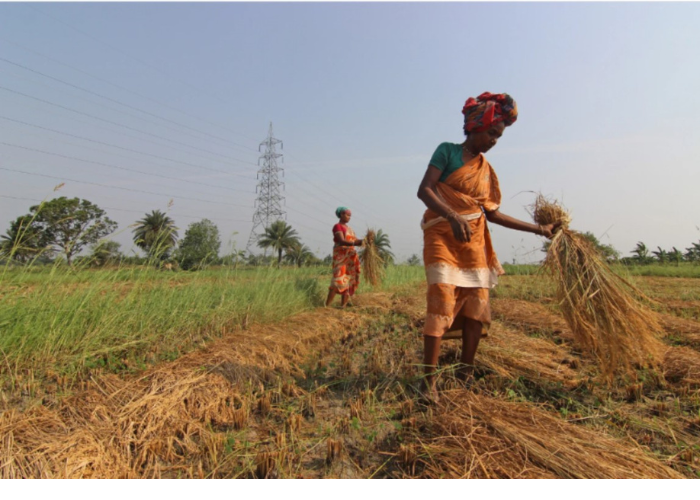How Women’s Role in Smallholder Farms Revolutionizes Food Loss ManagementBY ALANA HILL
- 9 April 2024
- Posted by: Competere
- Categories: highlights, News, Sustainable Nutrition

THE STATE OF FOOD LOSS & WASTE TODAY
Food loss and waste have emerged as critical yet addressable challenges in global food systems, with extensive ramifications for sustainability, economic prosperity, and social equity. According to The Food and Agriculture Organization (FAO), food loss and waste account for ⅓ of global food production yearly. In less developed countries, 44% of post-harvest food loss occurs in the processing stage. The combination of poor practices, technical and technological limitations, labor and financial restrictions, and lack of proper infrastructure for transportation and storage all contribute to food loss in developing countries.
Numerous programs worldwide address this complex issue by offering diverse solutions to smallholder farms, thus contributing to the overall balance of the food system. As projects are revised and instilled, the focus has broadened toward women’s empowerment, as they handle most of the post-production and processing. In return, malnourished populations in developing countries decrease along with food loss.
What are the direct causes of food waste, and what technological solutions may mitigate them? Solutions include teaching smallholder farms sustainable practices, providing innovative technologies, fostering economically viable associations, and recognizing the importance of women’s work throughout activities. In developing countries, programs profoundly impact more than just food production and distribution systems.
THE INFLUENCE GENDER HAS ON FOOD LOSS AND WASTE
About 50% of food development involves women at multiple stages on smallholder farms and fisheries. The Food and Agriculture Organization (FAO) and the International Fund for Agriculture Development (IFAD) are attentive to their cultivation practices and create solutions to balance their operations and reduce food loss, all structured around family life. The consequence is the liberation of millions of people from poverty, and the GDP rises 1-3%. Constructive economic and mitigation tactics develop as institutions create guidelines and policies supporting women and diminishing food loss.
FOSTERING A BETTER FUTURE IN SENEGAL & PARAGUAY
In Senegal, smallholder farming is the backbone of villages, accounting for 30% of the population, but shifts in weather patterns due to climate change threaten its security. To address this, the Strengthening Agricultural Adaptation (SAGA) program, funded by the Government of Quebec, nurtures community engagement, resilient agriculture, and sustainable development. Gender-sensitive Farmer Field Schools, soil health training initiatives, and community-based natural resource management initiatives have reached more than 1000 women and 480 men. Discussions on self-esteem and leadership spread the understanding of women’s fundamental role in agriculture and adaptation to climate change, which strengthens livelihoods and builds resilience as a community.
In Paraguay, initiatives address the economic gap of small-scale agricultural producers. In the country, around ⅔ of farming families are poor, and the situation is worsening due to climate change, soil degradation, and deforestation. To combat these issues, IFAD and Paraguay’s Ministry of Agriculture and Livestock implement pooling of resources, access to training, business and enterprise courses, and tools to improve agricultural infrastructure. A group of women formed an association, de Feriantes Dos de Oro, where IFAD supports increasing income, reducing food waste, and fortifying the food system. The women partnered with IFAD, strengthening the economic system and growing their community to new heights. Now, families make $400-500 USD a month instead of the previous $40-50 USD a month. The 1000% income increase underscores the transformative impact of empowering initiatives, offering families newfound financial stability and opportunities for a brighter future.
REDUCING DEFICIENCIES THROUGH FLW
Indonesia is known for its plentiful palm oil industry and other agricultural cultivations while focusing on minimizing food loss. The Ministry of National Development Planning supports the circular economy and low-carbon development. By tackling food loss, individuals boost their intake of vital nutrients, such as iron, which is crucial for pregnant women’s diet. The program also focuses on women’s empowerment in small entrepreneurial farms by counseling mothers and instilling policies to protect women in employment. As a result of these efforts, not only has there been a remarkable increase in household income, but the program’s emphasis on women’s empowerment in small entrepreneurial farms has fostered greater economic independence and security, enriching the lives of countless mothers and their families. The struggling population of Indonesia is now provided with a nutritional surplus, addressing the 61-125 million people who can benefit from saving food from being lost.
MAXIMIZING WOMEN POTENTIAL
Women’s participation in Food Loss & Waste reduction benefits society, with a reduction in post-harvest losses by up to 30%. Mothers can adequately feed their families, have the time for their children, establish associations to further their education, and much more. Food loss and waste, nutrient deficiencies, and poverty rates decrease as smallholder farms’ profits and contributions to the food system and GDP increase. As women actively engage in these programs, they become catalysts for positive change, fostering healthier communities and more sustainable agricultural practices. The ripple effect of their involvement extends far beyond immediate families, influencing society’s overall prosperity.
.

